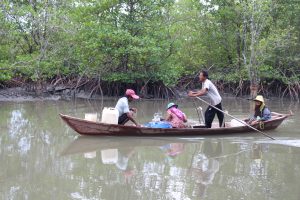Aware of the challenges of implementing the plans and policies in the National REDD+ strategy designed during the readiness phase, the Royal Government of Cambodian (RGC) and the Government of Ecuador will hold a series of technical meetings and joint workshops during a South-South Knowledge exchange mission from December 6 to December 12, 2017 in Quito, Ecuador.
A high-level Cambodian delegation composed of 12 executives and technical staff from the Ministry of Environment, the Ministry of Agriculture, Forest and Fisheries, and the National Council for Sustainable Development (NCSD), including the Director of GDANCP, the Undersecretary General of NCSD, the Deputy Director of Forestry Administration, REDD+ national focal point, and the REDD+ secretary will visit Ecuador to learn lessons and seek advice to advance their REDD+ implementation efforts. The Cambodian delegation will be received by the Minister of Environment, Dr. Tarsicio Granizo, the Undersecretaries of Climate Change and Natural Heritage and various technical and political officials of the Ministry of Environment of the Government of Ecuador, as well as UNDP and FAO REDD+ advisers.

Considering that Cambodia has centralized its efforts in developing sectoral actions plans such as forestry, fisheries and protected areas and other relevant sectors for forest management, this exchange will allow the Cambodian delegation to learn about the sectorial action plans being developed and implemented by Ecuador under their REDD+ Action Plan. Indeed, through this exchange Ecuador will share lessons on other approaches that could be feasible for sustainable forest management, payment for ecosystem services (PES) and to develop financial strategies with public and private efforts to mobilize resources to implement REDD+.
It is also an opportunity for Cambodia to learn about the challenges and successes experienced by Ecuador in fulfilling all of the REDD+ technical requirements under by the United Nations Framework Convention on Climate Change (UNFCCC) to access results-based payments for REDD+. This includes the establishment of a safeguards information system, the reporting of emission reduction results through the submission of a biennial update report (BUR), and a national forest monitoring system.
The Cambodian delegation will also visit a community in the province of Tena that is registered under the Government of Ecuador’s Social Forestry (‘SocioBosque’) program. This field visit will serve as an example of the implementation of REDD+ in the provinces, and will provide the delegation with valuable insights into the implementation of effective programs for locally-driven sustainable forest management.
At the end of the mission, the leaders and members of Cambodia’s REDD+ program will have had the opportunity to exchange points of view and knowledge with key decision makers and practitioners of the Ecuador REDD+ program, and will have new tools and pragmatic approaches to feed into Cambodia’s national REDD+ action plan. In addition, they will have learned first-hand how the government of Ecuador coordinates the implementation of REDD+ at different levels of its administration.
